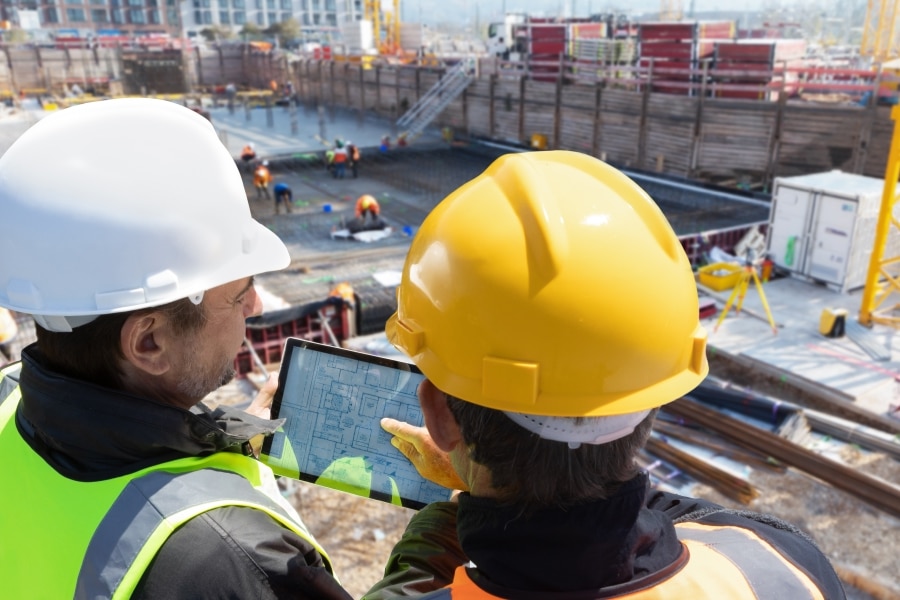Video produced by The B1M in partnership with Bluebeam
Ryan Friend, Jr. Industry Consultant, Bluebeam
Why work in construction?

I work in construction because I’m drawn to the idea of ending my workday and being able to look back and see the actual, physical work my team accomplished that day. Construction is the built world around us, and it is constantly changing, which is what makes working in this industry fun. From the exciting new technology to the crazy new ideas for projects, the industry is moving so quickly that it’s almost hard to not love working in construction.
What was your first industry job? How did that job shape your perspective on the industry?
My first job in the industry was interning with a small civil design firm out of Kansas City, Missouri. I took the job after my freshman year of college to get my feet wet and to make some money.
My most memorable task working with that firm was being assigned to the survey team at the Kansas City International Airport. I was assigned to the wastewater crew. This meant I would go around the Airport parking lots, popping storm drain lids in order to climb down into the drainage pipes to take a measurement of the diameter of the pipe and take a picture.
This information was necessary for the upcoming project, and clearly they picked the lowest man on the totem pole for this role. Although it was dirty and grimy, and I sometimes had to make friends with the little critters that live in the sewer system, I truly learned a lot about one of the more integral parts of our industry, as well as learning I was not cut out for wastewater construction.
What’s one misconception about the industry that you’d like to correct?
In my opinion the biggest misconception about the construction industry is that construction is entirely physical labor. Although the physical labor is what powers our industry, and without it we would not be able to go forward, there is a lot more to the industry than just the masons and carpenters on the jobsite. I think that many people don’t realize how much opportunity lies in the industry, and how many jobs not related to physical labor are available.
Jennifer Younes, Sr. Product Marketing Specialist, Bluebeam
Why work in construction?

Construction is a phenomenal industry to be in. There are new and unique opportunities each day and the industry is constantly challenging the status quo with technological advancements. It’s an absolutely amazing feeling to be part of building incredible projects and positively impacting communities.
What was your first industry job? How did that job shape your perspective on the industry?
My first job was a project engineer with Barton Malow on the Daytona International Speedway project. It helped shape my perspective in countless ways—from experiencing the vast opportunities for technology to make an impact on the industry to the importance of project partners working together and all that goes into making incredible structures a reality.
What’s one misconception about the industry that you’d like to correct?
Technology is used more often than one might think. More and more technology is used and developed every day with advancements in drone technology, BIM, mobile technology, reality capture, MR/AR/VR, robotics and so much more.
Omar Sheikh, Sr. Professional Services Manager, Bluebeam
Why work in construction?

For the chance to have a lasting positive impact on people’s lives and the landscape we live in. Whether you’re building a car park, a home, a skyscraper or a bridge, that structure will be around for decades and have an impact on the thousands if not millions of people who use it. There are very few other industries that have that much of a visible, tangible impact on everyday lives.
What was your first industry job? How did that job shape your perspective on the industry?
My first job in the industry was by luck more than anything. I was looking for my first job after graduating from university with an IT degree. I’d take anything in any industry at that point. Thankfully, I found a role at Bechtel supporting their document management systems and general technology use on their Engineering, Procurement & Construction (EPC) projects.
My first project was working on the expansion of what was to become the largest oil refinery in the world in Jamnagar, India. I was mesmerized. The sheer scale of this project—from the number of engineers working worldwide to the tens of thousands of documents they produced to storage tanks the size of city blocks and the overall refinery site that was larger than the M25 loop (a highway that surrounds London, 117 miles around). It was just mind-blowingly massive!
What’s one misconception about the industry that you’d like to correct?
The misconception that the construction industry is inefficient and hasn’t adopted technology like other industries have. While technology hasn’t historically made as big of an impact on construction as it has in other industries, the landscape is rapidly changing. There is a growing number of software tools available to cover all aspects of the industry—be it point solutions to solve single problems or workflows or larger platforms that cover the entire construction process from start to finish.
While the number of tools is not new, we’ve seen an increasing number of investors fuel startups for a number of years; it’s the willingness to adopt these tools that has changed. Construction professionals are now much more open to leveraging technology in their day-to-day work, and this has only been accelerated by COVID-19 and the new challenges that it has brought to the way we build.
Amanda Wieting, Sr. Technical Account Manager, Bluebeam
Why work in construction?

For me, the reward of working in construction are the contributions made to our communities and society. My dad recently had open heart surgery and ended up being cared for at the Cleveland Clinic, which was my first project with Whiting-Turner. It felt surreal to be sitting in a training room learning about what the day would be like (the series of pages I’d be getting through the surgery, what to expect when seeing him in the ICU and where to find help if needed), while also remembering back to testing the AV controls for this very room prior to building occupancy.
I’ve always felt proud of the projects I was part of and loved having this physical structure there at the end, proof of the blood, sweat and tears shed. However, being with my dad through his surgery and recovery period gave me a new appreciation of the construction industry and all of that goes into providing these thoughtful spaces that are very impactful to the lives of those that work, live or visit.
What was your first industry job? How did that job shape your perspective on the industry?
I was a project manager for Whiting-Turner before I joined Bluebeam. I started with WT as a project engineer just out of college and worked up from there into the project manager role. My undergrad is in mechanical engineering so I ended up spending most of my time with WT managing MEP/Teledata contracts and coordination.
My time with Whiting-Turner showed me the passion, tenacity and grit that comes with the construction industry. To this day, thinking about the building process and all of the people and parts that come together to make it happen remains awe-inspiring.
What’s one misconception about the industry that you’d like to correct?
The thing about construction that many people don’t realize is that anyone can have a career in the industry. I didn’t know much about the world of construction when I started in the industry. If you’re willing to learn, ask questions and listen, you’ll find there are plenty of people willing to help you.
Lilian Magallanes, Industry Alliances Manager, Bluebeam
Why work in construction?

There’s something special when you drive around cities and you see a project that you worked on and you point to it and say, “Hey, I worked on that building!” to your friends or family. Construction is part of the fabric of my DNA—my grandfather is a carpenter, and I grew up around construction my whole life. Today, we haven’t seen much change in how we build buildings, but I find it exciting how construction technology is changing the way we communicate and collaborate with project stakeholders.
What was your first industry job? How did that job shape your perspective on the industry?
My first job out of college was working with an architect as a project assistant. I took the job because it was a recession, so my options were limited, but it opened the door to my next job working for the LACCD’s bond project but to a whole new world in construction technology.
What’s one misconception about the industry that you’d like to correct?
Construction isn’t just about hard hats and boots; it’s more than that. It’s about building what our imagination thinks impossible and working alongside smart men and women.
Collin Creach, Account Manager, Bluebeam
Why work in construction?

Construction is unique in that it is challenging, never easy, but always rewarding. To know that I am working for a technology company that helps enable the people that are building our world around us makes it very fulfilling.
What was your first industry job? How did that job shape your perspective on the industry?
My first industry job was with a large construction firm as a project solutions engineer. I worked with an internal training team to get users onboarded and up-to-speed with the various software they would be using on projects.
I was able to learn quickly that leveraging technology plays a big part in successfully running projects, and I witnessed that the future of construction trailers was moving in the direction from using slanted tables to view large-format paper drawings to simply installing 55” TVs to view the drawings and models electronically.
What’s one misconception about the industry that you’d like to correct?
In my case, it would be the misconception that you need to have a construction-related degree to get involved in this industry. I graduated with a degree in business administration but landed here due to my interest in both construction and technology. If you have an interest in the industry, there is probably a place for you.











